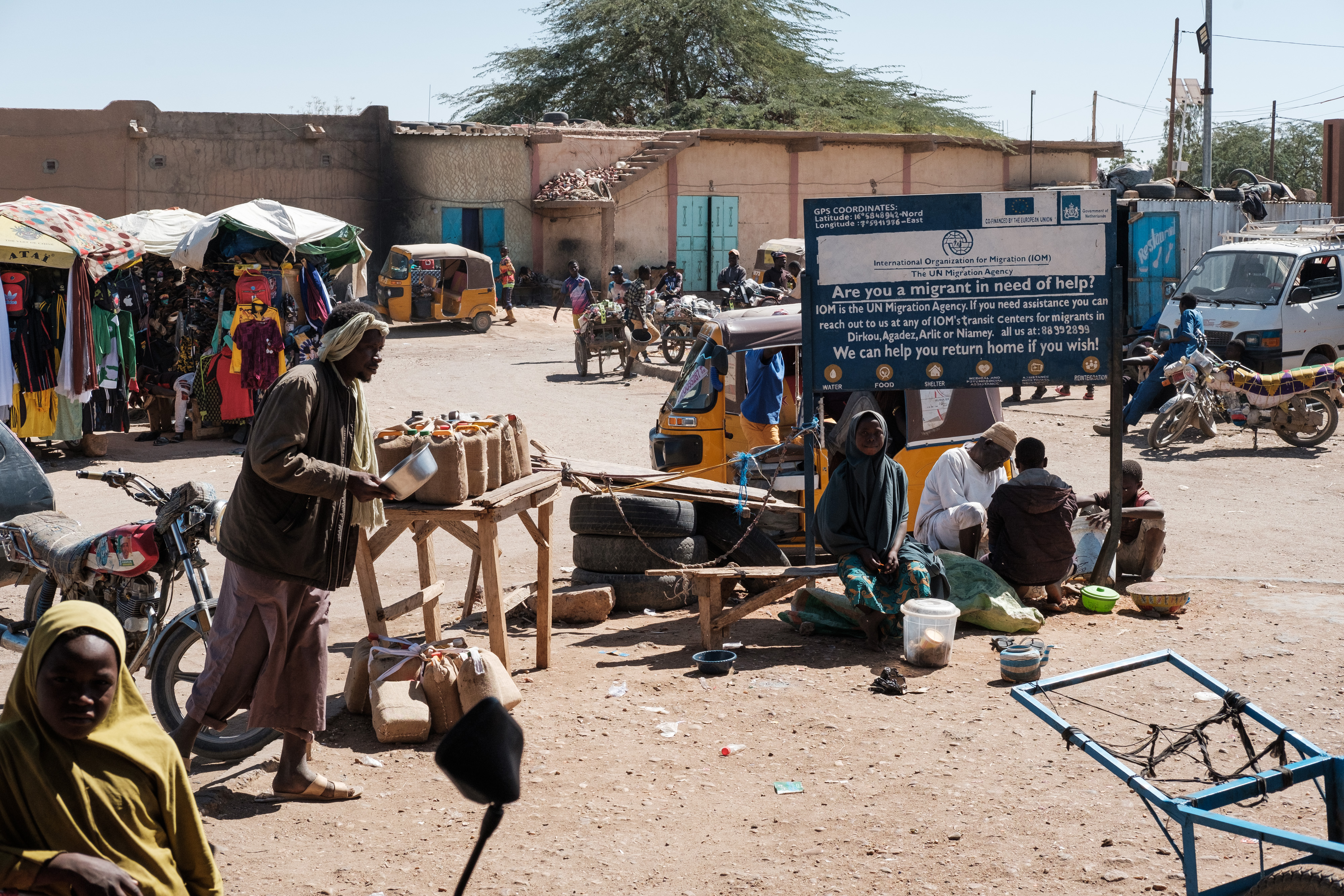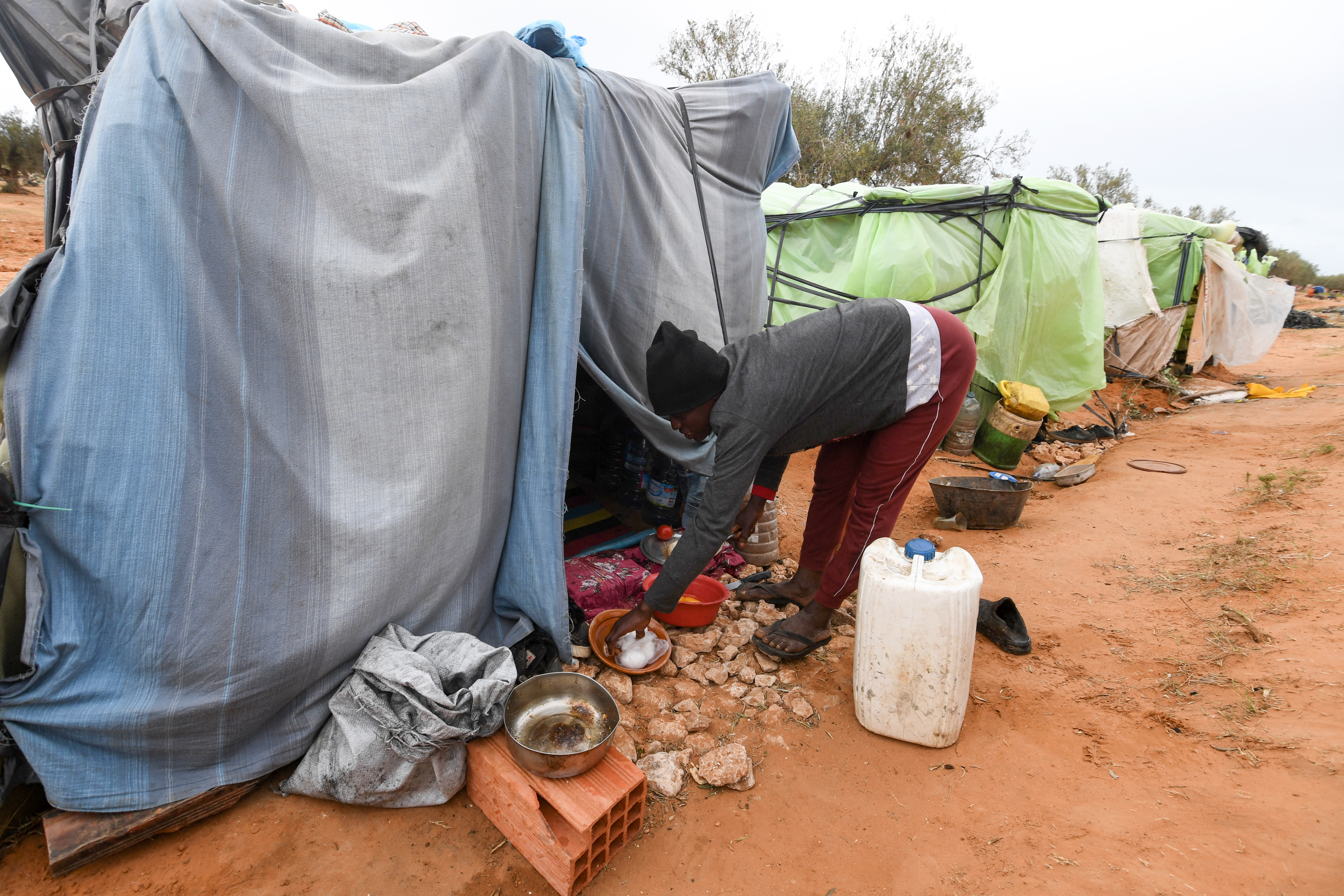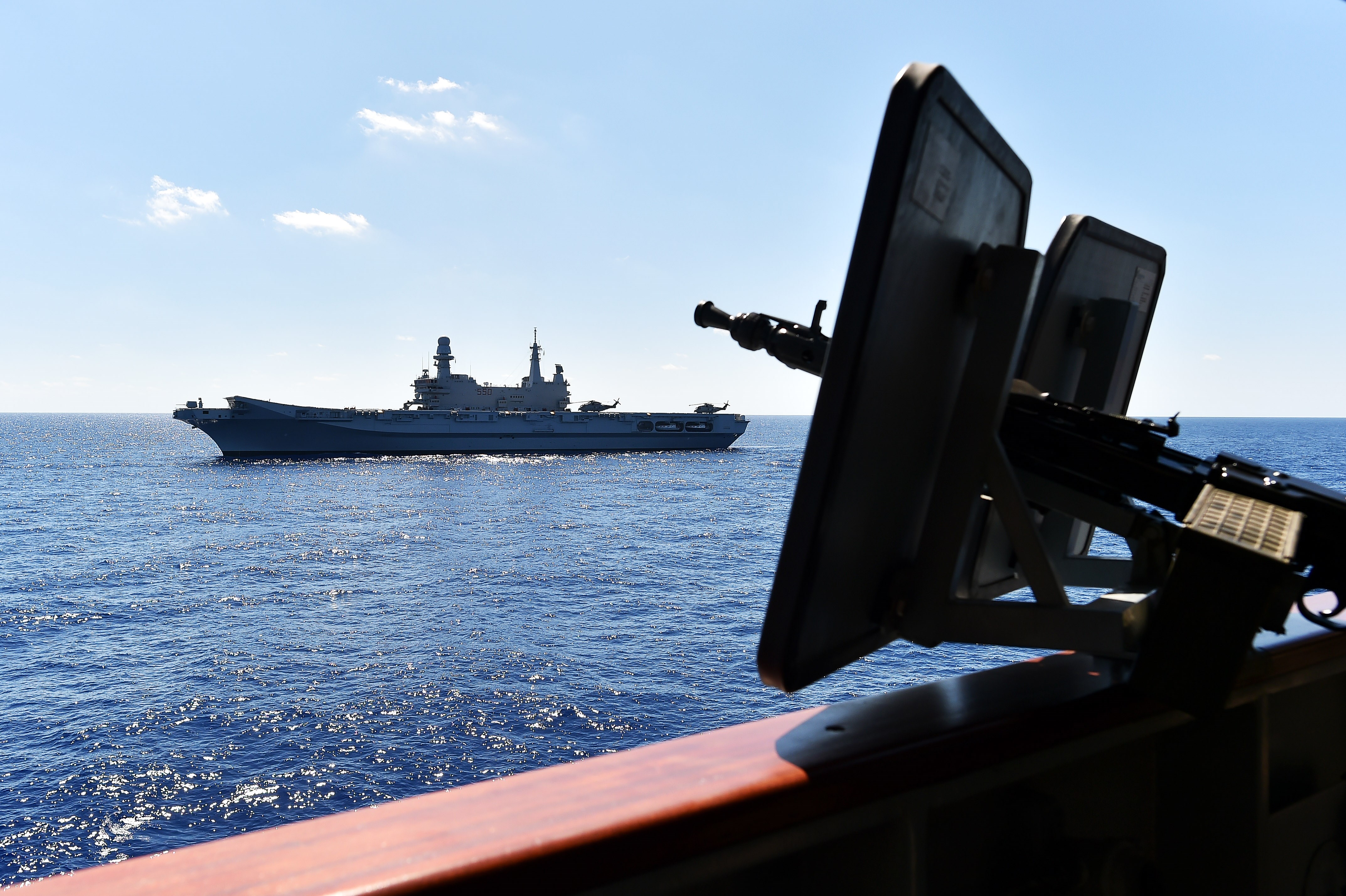
Libya, Tunisia, and Niger as Case Studies for Counter-Productive Anti-Migration Policies: Sustaining Abuses and Criminality
Executive Summary
Anti-migration policies in Libya, Tunisia, and Niger, have had dire consequences, as highlighted by the more than 25,000 migrant deaths in the Mediterranean since 2014, a staggeringly high figure that does not fully capture the extent of the tragedy. The European Union’s externalization of border controls to third countries has led to widespread human rights violations, bolstered criminal networks, and failed to achieve the intended goal of reducing migration. The narrative of “stabilization” promoted by international aid, notably to create a framework to justify anti-migration policies, has proven ineffective at addressing migration issues, as evidenced by political instability and violence in the region. Moreover, the EU’s focus on security-centric initiatives has exacerbated the plight of migrants, leading to increased deaths and abuses along migration routes. EU-funded initiatives have a track record of supporting authoritarian regimes and criminal networks, ultimately undermining efforts to address migration challenges.
To address these failures will require substantial policy changes and an evolution in approach to the migration issue. Regional and Western governments, international and non-governmental organizations (IOs, NGOs), as well as other relevant stakeholders should:
-
Prioritize governance reform: International stabilization and development programs should prioritize supporting the transformation and rebuilding of national and local institutions to ensure effective governance. This includes holding states accountable for harmful actions and promoting more humane policies to address migratory flows.
-
Pursue transparency and accountability: The international community must conduct honest reviews of aid policies to ensure they do not inadvertently support oppressive regimes or criminal activities. Funds should be directed toward NGOs working in prevention and protection rather than reinforcing oppressive institutions.
-
Uphold human rights standards: United Nations agencies and NGOs should have unhindered access to vulnerable populations, and European countries should recognize and address the abuses endured by migrants on their journey to Europe. This includes applying the same standards to all countries receiving funding, including in North Africa and the Sahel, as seen in recent European Court of Human Rights decisions regarding asylum seekers in Turkey.
-
Redress rule of law: Urgent action is needed to redress the rule of law in Europe and hold states accountable for human rights abuses. This includes acknowledging the extensive proof of ongoing abuses in countries like Libya, Tunisia, and Niger, and halting returns to unsafe countries.
-
Protect innocent lives: Ultimately, the international community must prioritize policies that protect innocent lives and address the root causes of migration and instability, rather than exacerbating them through irresponsible actions and neglect of governance issues.

Introduction
At least 25,000 migrants trying to reach Europe from Africa have died in the Mediterranean Sea since 2014,1 a number that grossly underestimates the true scale of this calamity by failing to account for the thousands who died en route to the coast, in the Nigerien, Algerian, and Libyan deserts.2 This terrible human cost is partially the result of the European Union’s border “externalization” policies, enacted 20 years ago for internal political reasons — justified and framed within the “development” and “stabilization” narratives but backed by the “replacement theory” of the far right. The outsourcing of EU migration controls to third countries has bolstered the countless human rights violations and breaches of legal obligations as well as reinforced patterns of abuse by local security forces, boosted criminal networks, exacerbated human trafficking, and worsened other harms suffered by persons on the move in North Africa and the Sahel. Not only do these policies contravene the purported values upheld by the EU but they also violate its established rules and international treaties to which it or its member states are signatories. Moreover, the outsourcing of EU migration controls to third countries has proven ineffective in its objective of curbing migration. It stands as a testament to policy failure.
The Effect of the “Stabilization” Narrative on Migration Policies
For decades, the international community has devoted billions of euros in development and military aid to the countries of North Africa and the Sahel to help them contain migratory movements while combating terrorism and chronic political instability. However, recent coups in Mali, Niger, and Burkina Faso; growing authoritarianism in Tunisia; and ongoing violence in Libya have highlighted the failure of this effort and the broader stabilization narrative. “Stabilization” refers to the international community’s framework for action in both peacekeeping and development support. Within this context, a country is said to have been stabilized when violence reaches a level deemed acceptable to the international community and local elites — low enough to supposedly enable the country’s economic activity to be (re)launched, itself the ultimate guarantor of national stability. The underlying premise of this domestic application of Kantian commercial peace theory is that if the leaders of a conflict are doing business (legal or illegal) and have an interest in the continuity of their economic affairs, they will not wage war. The visible face of this stability — the indicator validating its supposed reality — is the holding of elections. If elections happen, it means that the country is “stable.”
Such elections do not necessarily elect democrats, however. With the more-or-less public and direct support of the international community, strongmen, often former warlords and criminals, frequently rise to positions of power on the local or national levels, in exchange for a guarantee that they will “stabilize” key territories. This is the pivotal moment when the economy of violence and hybrid systems of governance involving numerous players (state, army, traditional leaders, militias, criminals, etc.) are institutionalized. Once this paradigmatic “stability” has been achieved, the international community deems the context favorable for disbursing state aid and development programs, as well as implementing anti-migration policies, since “legitimate” institutional interlocutors exist. Criminal behaviors in public management, the creation of institutional rents, and the misappropriation of resources are all inevitably tolerated, forgotten, and even perpetuated, especially when part of anti-migration policies.
Such a technocratic vision of development aid and migration policy is a dangerous illusion — or willful hypocrisy. The continued push by recipient states to instrumentalize aid for political aims, contrary to its supposed core objective principles, serves to consolidate the same regimes that people have been fleeing from in the first place. By funding internal security forces in the name of migration control, the international community is participating in the exercise of violence not only against migrant or foreign populations but also against social or political movements making demands against these regimes. In addition to donor states, certain United Nations agencies — first and foremost the International Organization for Migration (IOM) and the Office of the UN High Commissioner for Refugees (UNHCR) — exacerbate migrants’ vulnerability through their contribution to insufficiently checked security programs and “voluntary return” schemes to unsafe countries, from which returnees often attempt to flee again. As noted by the Mixed Migration Centre,
Closely related to the issue of returns is that of reintegrating returnees. … The prospect of large numbers of disgruntled and unemployed recently returned young men worries governments in countries of origin, especially when they are stigmatised as criminals or failed migrants. Meanwhile, without much evidence of their efficacy, destination governments increasingly fund reintegration programmes, offering returnees training or employment with the objective that they don’t try to re-migrate. They [the EU] also provide these funds as a quid pro quo with origin governments who are willing to take back their nationals.3
This situation is compounded by the challenge faced by UN agencies and research institutions in speaking out against European Union migration policies, given the EU’s status as their primary donor bloc. Hence, current anti-migration policies merely serve EU member states’ internal political messaging, while being counterproductive to their main objective. In fact, EU anti-migration policies mainly create more dangerous migration.4 As per the UNHCR, a total of 266,940 migrants and refugees arrived in the Southern European countries of Spain, Italy, Greece, Malta, and Cyprus throughout the year 2023, with 97% of them arriving by sea.5 This surge represents a notable escalation of 67%, nearly two-thirds higher than the arrivals recorded in 2022, with a substantial rise in migration originating from Tunisia. The Mixed Migration Centre points out, citing IOM, “1,417 deaths or disappearances occurred along the Central Mediterranean route in 2022, mostly off the coast of Libya, followed by Tunisia.”6
Furthermore, the failures of development policies by corrupt and ineffective local governments, as well as those of their international supporters, feed the violence and xenophobia from which migrants also suffer in many countries. In the absence of reforms and in a difficult economic context, authoritarian leaders are often inclined to propagate conspiracy theories against the most vulnerable communities, which become easy scapegoats — as President Kais Saied did in Tunisia last July, accusing sub-Saharan migrants of seeking to demographically control the country and replace Tunisians.7 These accusations triggered unprecedented waves of violence, extortion, arbitrary arrests, and illegal expulsions of sub-Saharan migrants by the Tunisian security and military forces, which are notably financed by the EU.8

Political Choices: EU Anti-Migration Efforts in Libya, Tunisia, and Niger
Since 2016, Brussels has been funding the Libyan, Nigerien, and Tunisian governments to combat migratory flows through the European Union Emergency Trust Fund (EUTF). With the EUTF, the EU finances and equips security forces in Niger, Tunisia, and Libya, including the Libyan and Tunisian coast guards, to prevent migrants from reaching European shores.9 The €800 million project to stop illegal migration from North Africa to Europe additionally finances the Libyan government’s Ministry of the Interior and its operational arm, the Directorate for Combating Illicit Migration (DCIM). The DCIM manages around 10 official detention centers, including Abu Salim, Tariq al-Sikka, Ain Zara, al-Homs, and Zlitan.10 There are also unofficial detention centers run by militias, some of which are said to be supported by European governments, including Italy.11 One such center is Dhar el-Djebel. Inaccessible to non-governmental organizations (NGOs), the facility is a giant, completely walled-in hangar, where migrants have to climb out by rope and almost never see the light of day.12
Migrants originating from Central and West Africa transit in large numbers through Niger en route either to Algeria or Libya. Located in the middle of the country, at the crossroads between the main migration routes leading to North Africa, is the old town of Agadez. Some West and Central African asylum seekers who have spent time in Libya and Algeria eventually end up back in Agadez. They recount episodes of incarceration and violence at the hands of both Libyan prison guards and armed groups.13 Imprisonment (or forced labor), torture, and ransom demands have become a criminal industry over the past 10 years, carried out by multiple actors, some of whom are interlocutors of the EU and/or other international organizations.14 The following account describes the suffering endured by Bachir, a Sudanese asylum seeker, in Libyan prisons, as he was unable to pay his ransom:
In Tripoli, Bachir started a small business selling watches and glasses. He was kidnapped by a Katiba (armed group), and beaten on the feet. His older brother was told to pay 15,000 dinars and his older brother was made to listen to the torture. His older brother told him to wait and see because he didn’t have the 15,000 dinars. The older brother took the 15,000 dinars through another man. One day, he was released. His eyes were closed, and he was taken for a walk around town and dumped by the sea, [as well as] given 10 dinars. When he got out and joined his big brother, he decided not to go back to Sudan and Libya. He accumulated 1,650 dollars with his brothers and friends abroad and in Libya. … After 4 hours at sea, they were surrounded by the Libyan coast guard and taken to Az Zawiyah. He spent a year and three months in prison in Az Zawiyah. He spent a year and three months being transferred from one prison to another, and was again asked to pay a ransom of 3,000 dinars.15
In February 2023, the EU and Italy delivered a search-and-rescue vessel to the Libyan Coast Guard.16 Additionally, the EU pledged to provide four more such vessels but made no discernible effort to evaluate the practices of these coast guard forces. During a recent trip to Tripoli, Italy’s Prime Minister Giorgia Meloni also announced that her country would provide five “fully equipped” boats to Libya’s Coast Guard to intercept non-nationals. Moreover, Italy renewed a memorandum of understanding (MoU) with Libya, on Feb. 2 of that year, agreeing to support the North African state’s controversial “migration management” policies for a further three years.
On July 16, the EU announced the formalization of an MoU with Tunisia.17 This partnership entails a substantial funding package of up to €1 billion, of which €105 million has been designated to bolster border management, combat smuggling activities, facilitate returns, and reinforce efforts to curb irregular migration. Between 2015 and 2022, €93 million-€178 million of EU funds per year were already utilized to, among other objectives, enhance the capacities of security forces responsible for deterring irregular migration and intercepting boats en route to Europe. In addition to the EU’s contributions, last summer, France’s Interior Minister Gérald Darmanin committed to provide Tunisia with €25.8 million to assist in managing and mitigating the influx of irregular migrants.18
As Doctors Without Borders explains in its report “Out of Libya: Opening Safe Pathways for Vulnerable Migrants Stuck in Libya,” the EU and its member states’ choice to open up a very limited number of legal migration channels slows down and complicates the few existing ones, including for migrants in highly vulnerable situations.19 As a result, in 2021, only 1,662 of the approximately 42,000 people registered were able to leave Libya using the UNHCR’s resettlement mechanisms, and around 3,000 passed through the IOM voluntary return program.20 A specific program, the Emergency Transit Mechanism (ETM), run by the HCR-Niger, aims to evacuate to Nigerien territory people imprisoned in Libya but considered eligible for asylum and in a highly vulnerable situation. A second sorting is carried out by the agencies of various European countries, the United States, Canada, and Australia, with a view to resettlement in a third country. During the process, people wait in a camp outside Niger’s capital of Niamey, but there are no plans for those whose applications have been rejected. Between 2017 and December 2022, 4,063 people were evacuated from Libya, 3,526 were resettled in a third country, and 636 are waiting in Niger.21 Staffing levels to administer these asylum and resettlement programs remain very low.
The EU has made the decision to declare Tunisia and Niger safe places for disembarkation of third-country nationals intercepted or rescued at sea as well as “safe third countries” for transfers of asylum seekers. However, the EU Asylum Procedures Directive requires non-EU member states to meet specific criteria to be designated a “safe third country,” including posing “no risk of serious harm” to individuals sent there.22 In reality, neither Tunisia nor Libya nor Niger are able to ensure adequate protection and support for migrants; many passing through or sent there fall victim to ill treatment, forced evictions, or racist attacks.23 Libya also does not abide by the international Convention Relating to the Status of Refugees of 1951 and subsequent 1967 protocol with respect to the recognition of refugee status and the protection of refugees. Tunisia acceded to the 1951 refugee convention in 1957 and its 1967 protocol in 1968; however, the country lacks a national protection framework on asylum, which is in contradiction to the requirements of the convention. In turn, Niger, has adopted reasonable asylum laws, but its capacity to implement them is limited due to a lack of trained personnel. The EU is therefore making the decision to send back asylum seekers to countries where they risk serious harm.
Finally, by directing its migration policy assistance budgets primarily toward security-centric initiatives, the EU undermines its regional partners’ ability to provide medical or economic assistance to asylum seekers in distress.24 This has, for example, led to thousands being stranded in Niger, a country they did not want to settle in, and where their long-term presence is not guaranteed.25 Access to this asylum system is further limited by the recurrent practice of illegal pushback, particularly at the country’s southern borders.26 In Niger, disturbing accounts have surfaced linking police forces with bus drivers who have anonymously reported having been paid to transport migrants who had been pushed back from Algeria and Libya.27
To summarize, the EU and its partners have turned a blind eye to human right abuses and criminal offenses in return for a hypothetical reduction in migratory flows — all for the “good” of Europe’s populations and political expediency.

Disavowing All Legal Standards
As previously mentioned, the MoU that the EU recently signed with Tunisia — like many anti-migration programs led by the international community — neglects to incorporate guarantees to ensure officials respect the rights of migrants and asylum seekers. Moreover, it offers no safeguards against the EU’s financial or material contributions ultimately benefiting organizations implicated in human rights abuses.
As highlighted in the detailed reports by Amnesty International, Doctors Without Borders, and Human Rights Watch, the EU has chosen to fund the DCIM and the GEN-funded militias, which torture, enslave, and ill-treat the 7,000 or so migrants detained in their centers for an indefinite period, actions that go against many of the international conventions to which EU countries are signatories.28 According to a preliminary assessment by the office of the Prosecutor of the International Criminal Court, the treatments of migrants in these detention centers “may constitute crimes against humanity and war crimes.”
Due to the conditions of detention in migrant prisons, tuberculosis has spread throughout Libya. Migrants in DCIM detention centers are regularly kidnapped to be enslaved or forcibly recruited into militias. Migrants have also been transferred to detention centers located in war zones run by individuals under Security Council sanctions specifically for their mistreatment of migrants at those same centers. For example, at the Tripoli Gathering and Return Centre, colloquially known as al-Mabani, formerly under the control of a militia and now under the thumb of the DCIM, Amnesty International reported that guards raped women, and some detained migrants were coerced into sex in exchange for their release or for essentials such as clean water. At the Abu Issa center, in the city of al-Zawiya, detainees reported being deprived of food to the point of starvation. At the Abu Salim detention center, the denial of care for the sick led to the death of a woman as recently as August of last year.29
Other human rights violations are directly enacted by the EU itself. Pushbacks financed by the EU violate individuals’ rights to seek asylum and to leave any country, whether their own or another, trapping people in abusive situations, in complete breach of non-refoulement principles.30 In addition to not funding search-and-rescue operations, the EU is also voluntarily criminalizing the work of humanitarian organizations such as Sea-Watch conducting these operations. When EU member states disavow the right and obligation that vessels have under maritime law to rescue people in distress at sea, this leads to disastrous situations and the deaths of hundreds of people. The volunteer group Sea-Watch.org estimates that the number of people who died while trying to cross the Mediterranean Sea to reach EU shores between 2013 and 2023 was at least 27,047.31
Not rescuing people also avoids having to face the reality of the conditions they had to endure in Libya and Tunisia. Although the number of deaths in the Sahara is unknown, the criminalization of desert crossings, supported by the Nigerien government and the EU, has made this corridor much more dangerous because migrants and their traffickers have had to take even rougher routes, further from cities, waterpoints, and possible access to rescue.32 Moreover, between January and July 2023, some 20,000 people were deported from Algeria to the Niger desert.33
Finally, Doctors Without Borders’ “Out of Libya” report shows that the UNHCR, in agreement with the Libyan government and both funded by the EU, accepts only nine nationalities34 to be eligible for the services of the UN refugee agency and its partners or to receive paper validation allowing them to be recognized as refugees in another country.35 Vulnerable persons who arrive on Libyan soil from Western and Sub-Saharan African countries, such as the Democratic Republic of the Congo (DRC), are notably not eligible for UNHCR and implementing partner services, thus disproportionately worsening their already grim prospects of making it out of Libya.36 Such arbitrary discrimination to the right to access asylum excludes persons who would otherwise be eligible based on the criteria set out by the UNHCR and its founding convention. Although Libya is not a signatory to the 1951 refugee convention, the UNHCR has made the decision to remain in the war-torn country to at least try to assist some rather than providing no help at all.37

Reinforcing Criminal Patterns
The EU and its regional partners also offer direct technical and financial resources to criminals — as well as a blanket geopolitical immunity card. As noted above, Europe finances the Tunisian and Libyan coast guards, despite repeat evidence of their collusion with human traffickers.38 The pattern is as follows: Traffickers lower prices for traversing the Mediterranean to a minimum, which at the moment is between €300 and €500 for a crossing from Sfax, Tunisia, to Italy.39 These attractive prices encourage migrants to try their luck. However, once the boats have left, the traffickers call the local coast guard, which intercepts the boats, brings them back to shore, and then detains and extorts the migrants who were aboard. The cycle repeats itself until, by chance, a boat gets through. Either way, the criminal networks as well as the coast guards are enriched in the process. However, the EU is not only watching from afar. According to a Human Rights Watch-Border Forensics investigation, one-third of the interceptions in 2021/2022 — over 20,000 people — made by the Libyan Coast Guard were deliberately facilitated by intelligence gathered by Frontex from aerial surveillance made by contracted private companies’ aircraft and unarmed drones.40
The EU has also contributed to the bolstering of the human-smuggling industry in northern Niger, western Sudan, and southern Libya, no-man’s lands where nobody knows the precise number of migrant deaths that might have occurred in recent years. At least since 2016, the EU financed the Rapid Support Forces (RSF) of Mohamed Hamdan Dagalo (Hemedti), which participated in many human trafficking operations in Sudan.41 The RSF is currently embroiled in a civil war, during which it has perpetrated various abuses and atrocities.42 The EU also attempted to curb migration flows in Niger, strongly pressuring the government to pass a law in 2015 that criminalized transporting and housing migrants illegally leaving the country.43 The criminalization of the migration industry greatly affected the regional economy of Niger’s northern regions, as smugglers were briefly arrested and their vehicles seized specifically to benefit other smugglers with closer links to state officials.
Supported and compelled by EU funding, the Nigerien government asserted control over the main routes leading to the northern regions of the country.44 Consequently, the smuggling networks started to use more scattered and remote routes, ones with less access to water or cellphone reception. These routes are also more prone to vehicle breakdowns and encounters with armed bandits who hijack migrant convoys. To compensate for those inevitable losses, traffickers have taken to transporting more migrants per convoy. All of these factors contribute to the reported increase in migrant deaths in the Algerian and Nigerien deserts. Further exacerbating this situation, Algerian forces also kidnap, maltreat, and expel numerous migrants without condemnations by the EU.
The transport of migrants is particularly profitable: Migrants reportedly pay €1,400 to travel from southern Niger to Libya and €1,500 to be transported from southern Sudan to Libya. Another increasingly common practice is for migrants to pay a discounted fee of €80 or €100 to travel from Agadez (Niger) to Tamanrasset (Algeria) or Sebha (Libya), but in return they must agree to be exploited as slave labor in agricultural fields or to transport illicit products (drugs, medicines such as tramadol or pregabalin, alcohol); this makes them individually criminally liable in the event of a seizure by the authorities.45 Such additional revenue sources for traffickers have contributed to reinforcing the institutionalization and sophistication of criminal networks, which use this money to expand into new illicit activities. Sexual slavery has sharply increased all along North African migration routes as women regularly are forced to prostitute themselves to pay for their trips. The price of corruption and rents derived from embezzled aid funds in Niger and Sudan have also considerably increased over the years, thus reinforcing the criminal practices of local governments. Yet even as conditions have deteriorated, migration flows have neither stopped nor slowed, it has just been made more dangerous.46

What Solutions Are Possible?
If the international community’s stabilization and development programs continue to ignore the problematic functioning of the national and local institutions they support, they will end up doing more harm than good. The security-first anti-migration policies that are being promoted in North Africa and the Sahel actually create more migration, encourage crime, and result in greater numbers of deaths than if the focus of the aid was on development and virtuous governance practices. An honest review of these international programs concludes that they pay the salaries and reinforce the capabilities of local human rights abusers and traffickers, while devoting no funds to the NGOs that work in prevention and protection.47 The present aid system is at least partially responsible for the thousands of deaths of young migrants every year: for instance, unreliable bone tests are being used by UN agencies to wrongfully claim that children are adults, and these individuals are then denied appropriate care.48 Some UN officials effectively blamed victims and their families, as the UNHCR Special Envoy to the Mediterranean Sea did in a tweet in September 2022:
Grieving for the loss. But the same mothers had no problem encouraging or funding their children to embark on those dangerous journeys. Like in Senegal, symbolically prosecuting parents for putting at risk their children could trigger serious attitudinal change on death journeys.49
To achieve lasting stability, international actors need to support a process of transformation that not only reforms but also restores accountable state structures, including transparent and effective modes of governance, throughout the North Africa and Sahel region — in fact, this is the only way to combat migration. Red lines must be drawn, and regional states must be held accountable for the harm done in order to move them toward more humane policies. In turn, UN agencies must be given the ability to conduct themselves according to the principles, conventions, and treaties that are in place to guide them. Finally, NGOs must, at a minimum, be given the ability to reach vulnerable people in need. European countries should also recognize the horrific abuses migrants experience en route to Europe, especially inside countries that the EU financially supports.
Since 2017, several European Court of Human Rights decisions halted the returns of asylum seekers to Turkey due to concerns over safety there. Yet the same considerations are not being applied to Libya, Tunisia, Niger, and many other regional states, despite extensive proof of ongoing abuses suffered by migrants passing through these countries. There is an urgent need for European donors to redress such acute rule of law failures. The lives of countless innocent people depend on it.
About the Author
Guillaume Soto-Mayor is a Non-Resident Scholar with MEI’s North Africa and the Sahel Program with an expertise in political violence, security, peace, migration, and governance in West and Central Africa. With a decade’s worth of experience in the international security sector and field research capacity (Africa, Europe), combining work as a senior manager with a specialty in intelligence acquisition and analysis, he has conducted high-level policy advice and operational support at the local, governmental, and inter-governmental levels (European Union, United Nations Security Council). Moreover, he has led in-depth field research on criminal and terrorist networks in West, Central, East, and North Africa. Soto-Mayor is the author of several reports and articles published in foreign policy and academic journals, as well as newspapers in both French and English. He graduated with high distinction from the University of Oxford and Sciences Po Strasbourg.
The author wishes to acknowledge that this Study was written with the support of Florence Boyer, a research fellow at the Unité de Recherche Migrations et Société (URMIS) – CNRS – IRD.
Endnotes
Distribution channels: Politics
Legal Disclaimer:
EIN Presswire provides this news content "as is" without warranty of any kind. We do not accept any responsibility or liability for the accuracy, content, images, videos, licenses, completeness, legality, or reliability of the information contained in this article. If you have any complaints or copyright issues related to this article, kindly contact the author above.
Submit your press release